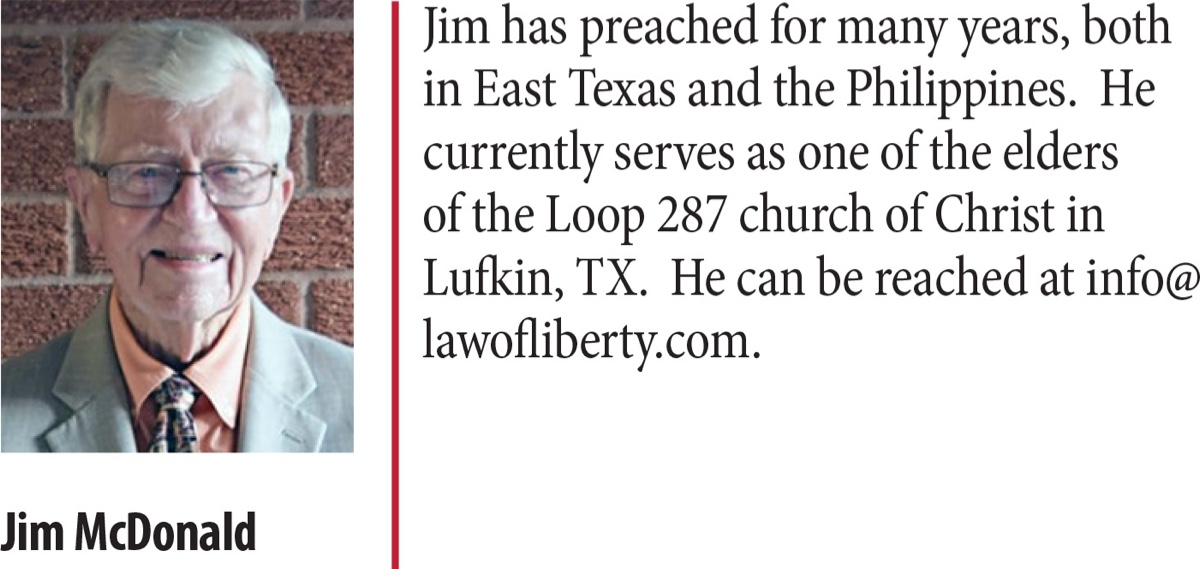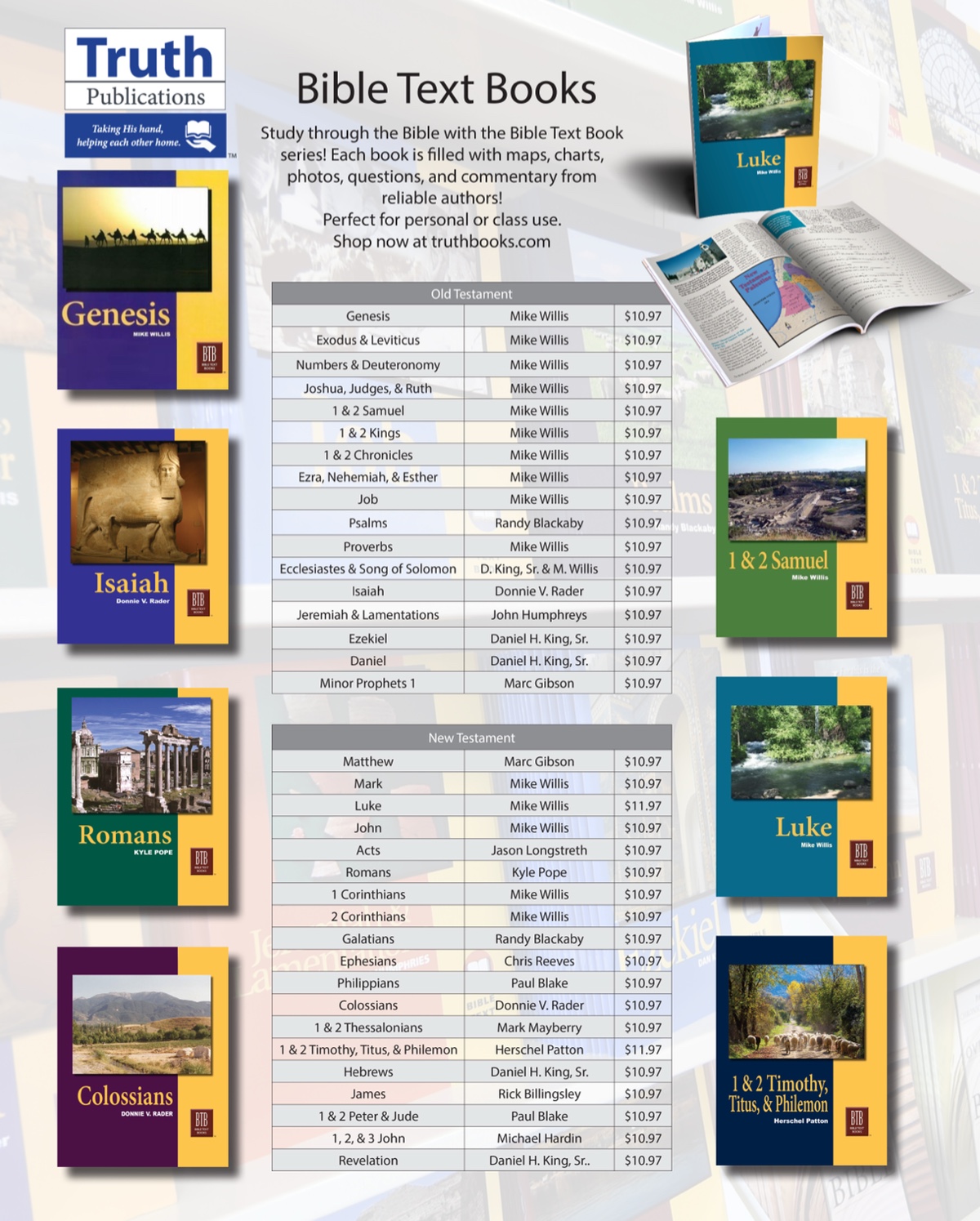By Jim McDonald
Synopsis: Jesus Christ established the church, along with its offices of revelation (apostles and prophets), oversight (pastors), and instruction (evangelists and teachers).
Paul wrote, “Whereby He saith, when He ascended on high, He led captivity captive and gave gifts to men. (Now this, He ascended what is it but that He also descended into the lower parts of the earth? He that descended is the same also that ascended far above all the heavens, that He might fill all things.) And He gave some to be apostles; and some prophets; and some, evangelists; and some, pastors and teachers; for the perfecting of the saints, unto the work of ministering, unto the building up of the body of Christ” (Eph. 4:8-12).
Ephesians 4 is pivotal: the three chapters before include revelations reflecting the mystery (the church) that had been hidden for ages in God’s mind. Following the exhortations of Ephesians 4:1-16, the apostle turns to exhortations to Christians in their various roles in life: husband and wives, parents and children, and servants and masters. The apostle appealed to the Ephesians: “Walk worthily of the calling they had been called with, to endeavor to keep the unity of the Spirit in the bond of peace.” He has carried them through how God, from eternity, planned to bless all nations in His Son, Jesus, which blessing is the forgiveness of sins. He has shown them (chapter 2) how God had broken down the partition wall (the Law, Eph. 2:14-15) between them and that God had reconciled Jew and Gentile together to each other and God in one body (the church, 2:16). He has revealed that the mystery of God is made known by the church—that mystery is that Jew and Gentiles are fellow citizens (2:19), fellow heirs, fellow members of the body, and fellow partakers of the promises in Christ (Eph. 3:6).
Still, although God joined Jew and Gentile together in one body, the enmity that had existed for centuries between them was something not easily overcome and persistent diligence by all of them was necessary if they were to keep the “unity of the Spirit in the bond of peace.” He reminded them that there was one body, one Spirit, one hope, one Lord, one faith, one baptism, and one God—and that all had been blessed with the gift of salvation (4:1-7).
The gift of salvation given to all was not the only gift Jesus gave His church. The imagery of 4:8, “when He ascended on high He led captivity captive and gave gifts to men,” is drawn from the victor or conqueror of a city or nation when he led a “victory march” exhibiting the booty he had gained from those he had conquered, as well as the prisoners and slaves he brought back with him. To those who had sent him out and supported him, rich gifts were given. Christ “led captivity captive.” He had conquered death, the grave, sin, and Satan. By His resurrection, death and the grave need hold no fear for man. By His death, freedom from sin is possible and Satan (who introduced both sin and death to man) has been conquered. Paul continued the imagery of Christ’s victory march by stating that Christ “gave gifts to men.”
“He gave some. . . apostles.” This word means “one sent” and in the general meaning of the word we read that Paul and Barnabas were apostles (Acts 14:14) and that Andronicus and Junias were said to be “of note among the apostles” (Rom. 16:7). In the same general sense of the word, James, the Lord’s brother, is called an apostle (Gal. 1:9). Jesus is called the “apostle and high priest of our confession” (Heb. 3:1). For most people, however, “apostle” is the word they connect with the twelve men whom Jesus chose from among His disciples and then called “apostles.” These men became His ambassadors to preach the gospel to all the world (Matt. 28:18; Mark 16:15), and special qualifications had to be met before one could be an apostle in this latter sense: they must have accompanied the Lord from the “baptism of John” and been a witness of the resurrected Christ (Acts 1:21-22).
Paul was an apostle on the same level as the twelve who, although he had not accompanied the others during Christ’s personal ministry, he was a witness of the resurrected Christ. His apostleship was to the Gentiles (Gal. 2:7-9; 1 Cor. 15:8-9). There is a uniqueness in the twelve and Paul, and because to be an apostle in the sense they were, it was necessary that one be a witness of the resurrected Christ. None meet that qualification today and so none are apostles, as were these men. It was of these men the apostle wrote when he said, “And He gave some to be apostles. . .”
When Jesus chose the Twelve during His personal ministry, He “gave them authority over unclean spirits, to cast them out, and to heal all manner of diseases and all manner of sicknesses” (Matt. 10:l). He even gave them power to raise the dead (Matt. 10:8), and although at least Peter did this on one occasion (Acts 9:36-41), there is no record of any they raised during the personal ministry of Jesus. However, the four gospels emphasize the works of Jesus (not the Twelve), and just a small sample of what Jesus did is recorded (John 20:30; 21:25). The scope of the apostles’ preaching during Jesus’s personal ministry was limited, for Jesus charged them, “Go not into any way of the Gentiles, and enter not into any city of the Samaritans, but go rather to the lost sheep of the house of Israel, and as ye go, preach, saying the Kingdom of Heaven is at hand” (Matt. 10:5-7). After Jesus’s resurrection, when He was preparing to return to heaven to His Father, that limitation was removed.
Jesus charged them, “Go, teach all nations. . .” (Matt. 28:18); “Go into all the world. . .” (Mark 16:15), and, “that repentance and remission should be preached in My name among the nations. . .” (Luke 24:47). When Peter made the “good confession,” Jesus promised, “I will give unto thee the keys of the kingdom of heaven and whatsoever thou shalt bind on earth shall be bound in heaven and whatsoever they shalt loose on earth, shall be loosed in heaven” (Matt. 16:19). Still, while Peter had the privilege of opening the kingdom both to Jews and Gentiles (Acts 2:38; 10:44-48), power to bind and loose was given to all the apostles (Matt. 18:1, 18). The apostles were promised that “in the regeneration. . . ye (the apostles) also shall sit upon twelve thrones, judging the twelve tribes of Israel” (Matt. 19:28). As Christ’s personal ambassadors, they revealed Jesus’s will to and for men, for they spake not from themselves but from the Holy Spirit (Matt. 10:20). The early church recognized the authority of these men and they “continued steadfastly in the apostles’ doctrine” (Acts 2:42). When Jesus gave His “gift of apostles” to man, He gave to man His absolute authority and word.
We do not have living apostles today for His apostles were faithful to fulfill “teaching them to observe all things whatsoever I have commanded you” (Matt. 28:20). They died, but their words live on. “All Scripture is. . . profitable for doctrine, for reproof, for correction, for instruction which is in righteousness, that the man of God may be complete, furnished completely unto every good work” (2 Tim. 3:16-17). Jude urged Christians to “contend earnestly for the faith which was once for all delivered to the saints” (Jude 3).
When Jesus ascended on high, “He led captivity captive and gave gifts to men. . . and He gave some to be apostles, and some prophets, and some evangelists, and some pastors and teachers. . .” (Eph. 4:8, 11). These gifts were for the “perfecting of the saints, unto the work of ministering, unto the building up of the body of Christ” (Eph. 4:12).
“He gave some to be. . . prophets.” This gift, like that of the gift of apostles, required inspiration. Both of these required special revelation from God. The word prophecy means “to bubble up like a fountain.” “Prophets” have been found in every age of man. The first person to be called a prophet was Abraham (Gen. 20:7). During the period of the Law of Moses there were many prophets, foremost among them was Moses himself who was identified as a prophet and who spoke of Him who would be the greatest Prophet of all (Deut. 18:15). There were many prophets (both oral and written) from the giving of the Law until Jesus. In our present era, there were prophets in the early church—Jerusalem (Acts 11:27), Antioch of Syria (Acts 13:1), and Corinth (1 Cor. 14:1). One of the nine spiritual gifts was the gift of prophecy (1 Cor. 12:10), and prophets were common in many of the first congregations and consisted of both men and women (Acts 2:18; 21:9). To have prophets, it was essential that apostles visit the churches to bestow the gift, for it was through the laying on of hands that the Holy Spirit was given (Acts 8:18; 19:6). It was this gift that made possible the New Testament, whether it was books written by apostles (numbering twenty-one) or other inspired men (numbering six).
Then He gave “some to be evangelists.” This word literally means “a messenger of good.” Two men are specifically identified in the New Testament as “evangelists”—Philip (Acts 21:8) and Timothy (2 Tim. 1:6). Some view an evangelist as one who moves from place to place, not working with a local congregation. This view is not supported by what is known of New Testament evangelists. Philip’s work as an evangelist is recorded in Acts 8 and at the end of the chapter is recorded: “Philip was found at Azotus and passing through he preached the gospel to all the cities until he came to Caesarea” (Acts 8:40). Many years later, he was still in Caesarea, doing the work of an evangelist (Acts 21:8).
Then “He gave some to be pastors” (Eph. 4:11). A pastor is a shepherd and synonymous with elders and bishops. The work these men did was to oversee the flock, ward off false teachers, and watch on behalf of the souls of those entrusted to their care (Heb. 13:17). The modern day “pastor” in denominations was not the role of first-century pastors. Pastors in the first century may have been inspired, but inspiration is not a necessary requirement today, else we would have no pastors. Inspiration was to reveal God’s will, but that has been fully accomplished, and all the knowledge that either modern day evangelists or pastors need is recorded in the Holy Scriptures (2 Tim. 3:15-17).
Finally, He gave some to be “teachers.” There will always be a need for faithful teachers of the word. They are needed in every age, in every church, and will be until Jesus comes again.
These five “gifts”—apostles, prophets, evangelists, pastors, and teachers were to equip the church unto the “perfecting of the saints,” unto the “work of ministering,” and unto “the building up of the body of Christ” (Eph. 4:12). These gifts allowed God’s children to attain “unto the unity of the faith, of the knowledge of the Son of God, unto a full-grown man, unto the measure of the stature of the fulness of Christ: that we might be no longer children. . .” (Eph. 4:13-16).
The three works these five gifts equip the church for constitute the work God wants His church to do. The first, “the perfection of the saints,” is the building up of the newborn Christian. By a new birth, men are born again into the kingdom of God (John 3:3, 5). When we are born anew, we are babes and as such should “long for the spiritual milk which is without guile that we may grow thereby unto salvation” (1 Pet. 2:2). We are commanded to grow in the grace and knowledge of Jesus (2 Pet.3:18). God has provided us sufficient nourishment through the word that we may grow up “in all things into Him who is the head” (Eph. 4:15).
We are equipped unto “the work of ministering.” The second work of the church is ministering. There are many ways we may minister to brethren and filling their physical need for food, clothing, and shelter is one of them. God has supplied His church with knowledge and authority to do that.
Finally, there is the work of “building up the body of Christ.” The first and third work of the church overlaps in some respects, but are separate works for saving souls and then keeping them saved. It is the saving of souls which is first and foremost the “building up the body of Christ.” The church is the pillar and ground of the truth (1 Tim. 3:15). It is God’s organized means of spreading abroad the gospel. It sends out preachers and sustains them as they evangelize new fields. There is no organization other than the local church to carry on this work. That is the way God planned it and His church reflects His manifold wisdom (Eph. 3:8-11). These three works: preaching the gospel, edifying those saved, and providing relief for needy saints constitute the whole work God wants His church to do. Since He provided us “all things that pertain unto life and godliness” (2 Pet. 1:3), let all be content with what God has provided and wants us to do and work mightily to do it!



